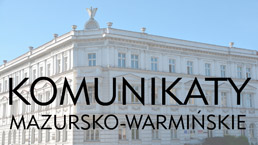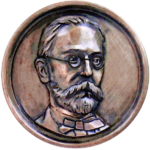Current issue
Online first
Special issues
Archive
About the Journal
Editorial Board
Editorial Council
Reviewers
Editorial guidelines
Publication ethics
Guidelines for reviewing
Remarks on “ghostwriting”
Copyrights and Open Access rule
GDPR Privacy Notice – for the authors of articles sent for publication in the "Komunikaty Mazursko-Warmińskie ("Masuro-Warmian Bulletin")
Contact
Price list
Prussian knights’ opposition at the beginning of 15th century
Online publication date: 2021-12-24
Publication date: 2021-12-24
KMW 2021;315(Komunikaty Mazursko-Warmińskie
Numer specjalny ):206-250
KEYWORDS
The Battle of Grunwaldopposition of the knighthoodPrussianknighthood14th and 15th centuryTeutonic Order
TOPICS
ABSTRACT
The article covers Prussian knights’ opposition against the Teutonic Order at the beginning
of 15th century – especially during the Great War with Poland and Lithuania. The main focal
point of the work is set on the Battle of Grunwald. The geographical scope is that of Prussia and
Culmerland and the chronological one is from the foundation of the Lizard League up to the
knights’ court in Bratian (1414).
Most of the knights mentioned belong to the politcaly active group, who wanted a bigger influence
on the current matters of the state. This resulted in a number of activities before the Battle
of Grunwald, including conspiracy (e.g. Jan Surwiłło [Hans Surwille]). Those activities did not
cease after the battle. A very good example is Mikołaj z Pilewic [von Pfeilsdorf], who had been
supplying the Teutonic Knights with false intelligence and had exchenged hostile to the Order
letters with the Poles. For sure this kind of opposition was not very widespread. After the
beginning of hostilities knights from Culmerland and Dobrzyn Land tried to acquire further
privileges from the Order, e.g. the privilege from October 1409.
It cannot be completely ruled out, that there was indeed an organized opposition before the
Battle of Grunwald. It has been confirmed, that there were Polish-speaking knights in the Teutonic
Order reconnaissance forces. In that light it is important to note Polish pennants found
after the arrest of Mikołaj from Pilewice and curious results of the reconnaissance after Polish
withdrawal from Kurzętnik. During the Battle of Grunwald the Culm Banner, which was a part of the last Teutonic Order strike, has surrendered to the Poles just after the death of the Grand
Master. The knights have been taken captive, so we cannot speak of high treason, but nevertheless
the surrender could have affected the battle’s outcome.
After the Order was defeated some of the knights have openly backed the Polish side – they
have pledged allegiance to Jagiełło and took part in storming of the Teutonic Order castles. In
cooperation with rebellious knights the Poles have captured Ostróda, Kowalewo, Krzyżbork,
Bałga and Kętrzyn. In effect, when Heinrich von Plauen became the Grand Master and Polish
forces have withdrawn in September–October of 1410, those knights have been severely punished,
without proper trials. The prosecution included, among others, Mikołaj from Plewice,
Eberhard from Korsze, Jochart from Kętrzyn and a certain Zbylut (most likely identical with
Zbylut Zebowski). Some knight fled to Poland (Mikołaj from Ryńsk [von Renis] or Stanisław
from Bolumin [von Bolmen] and some obtained pardon of the Grand Master (e.g. Albrecht
Karschau). Some of the fugitives later returned to Prussia, (Mikołaj from Ryńsk already in the
autumn of 1410). Soon after, the knights contacted the ambitious komtur of Radzyń Jerzy Wirsberg.
Probably they intended to overthrow Heinrich von Plauen and to force the new Grand
Master to give more privileges to the knights. The conspiracy was revealed and both Jerzy Wirsberg
and Mikołaj from Ryńsk were arrested. Mikołaj was later beheaded for treason. Other
memebers of the conspiracy (Janusz from Pułkowo [von Pulkau], Fryderyk from Kitnowo [von
Kintenau], Janusz from Szczuplinka [von Czipplin] and Gunter from Dylewo [von der Delau])
fled to Poland and tried to regain their properties. They, and also other fugitives (Jan Surwiłło,
Kacper/Jacob from Kobyły [von Kobil]) were backed by both Jagiełło and Witold. Finally, after
Heinrich von Plauen was overthrown most of the knights returned to Prussia and the knights’
tribunal acquitted the surviving members of Wirsberg conspiracy in 1414.
There are some striking similarities between the knights opposing the Order rule. They are
often members of the same family: brothers from Ryńsk and Kitowo, father and son from
Dylewo, father-in-law and son-in-law (Mikołaj from Ryńsk and Gunter from Dylewo), first
cousins (from Ryńsk, Kitnowo and Szczuplinki). Frequently they were also neighbours, especially
among those who came from Culmerland (Pilewice, Płąchawy, Robakowo and Kobyły;
Szczuplinki and Kitnowo; Słomowo and Bolumin; Ryńsk, Orzechowo and Pułkowo), but also
from Korsze region (Eberhard Kunseck, Albrecht Karschau and probably Jochart) and Ostróda
(Dylewo and Durąg).
At least some of the knights owned money to the Order. There is no comprehensive data, but
Dytryk and Gunter from Dylewo, Mikołaj from Ryńsk, Janusz from Pułkowo, Konrad from
Płąchawy [von Planchau], Janusz from Szczuplinki, Konrad from Orzechowo [von Orsechaw],
Mikołaj from Słomowo [von Slommau] and Janusz from Topolno [Toppolensky] were indebted.
This could not be without influence on their attitude to the Order.
To be fair one has to add, that there were also knights, who reminde faithful to the Order. The
best known examples are Mikołaj Witkop from Targowo [von Tergewisch], Szymon Wagil and
Albrechta from Wigwałd [von Wittchenwalde], who was given Sławkowo in 1411 „umb synes
getruwen dinstes willen, den her unsern orden in den groesten noten hat beweist”. Some of the
Lizard League members also remained faithful, e.g. Otton from Konojady [von Konoyad], who
was not persecuted after the Battle of Grunwald (he appears in the sources in 1417). His family
also worked with the Order: his brother Knrad (Kuncze) from Dąbrówka [von Damerau] was
working in the Teutonic Order intelligence.
At the beginning of the 15th century the Teutonic Order state was shaken by an internal struggle
between the knights with the Order authorities. Both parties remained without a clear victory
as their argument ended, for a time, in a stalemate. But the future would belong to the knights,
and in an alliance with burgers, they eventually defeated the Teutonic Order.
Share
RELATED ARTICLE
We process personal data collected when visiting the website. The function of obtaining information about users and their behavior is carried out by voluntarily entered information in forms and saving cookies in end devices. Data, including cookies, are used to provide services, improve the user experience and to analyze the traffic in accordance with the Privacy policy. Data are also collected and processed by Google Analytics tool (more).
You can change cookies settings in your browser. Restricted use of cookies in the browser configuration may affect some functionalities of the website.
You can change cookies settings in your browser. Restricted use of cookies in the browser configuration may affect some functionalities of the website.




